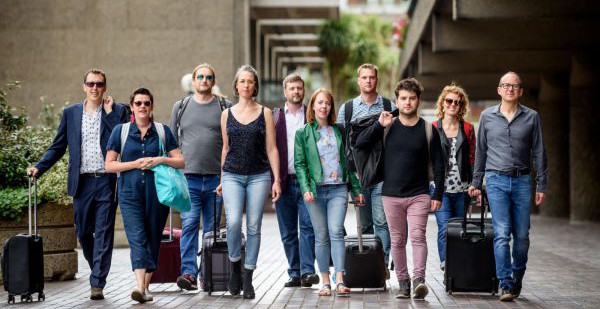
Exaudi
EXAUDI A CAPPELLA | PETER ZUMTHOR 16
Program
- Wolfgang Rihm: Quo me rapis (1990) - 11'
- Orlando di Lasso: Prophetiae Sibyllarum (Auszüge) (Text: Filippo Barbieri) (1505)) - 27'
-
Bruno Strobl: SiBYLLE – die Seherin
(2023 UA) - 5'
Kompositionsauftrag Wien Modern und Gesellschaft der Musikfreunde in Wien - Nicola Vicentino: Hierusalem (1555) - 1'
- Musica prisca caput (1555) - 4'
- Madrigalfragmente - 5'
- Naomi Pinnock: Landscape (2022) - 10'
- Cipriano de Rore: Calami sonum ferentes (1555) - 6'
- Luigi Nono: Sarà dolce tacere »Süß wird schweigen sein« (Text: Cesare Pavese) (1960) - 10'
Cast
- Exaudi
- James Weeks: Leitung
"A marking listening experience certainly took place in the beautiful baroque monastery church of Mariastein in the canton of Solothurn; the Gregorian chants of the monks there are still in my ears today. Only much later did I realize that voices need spaces. When the monks line up in the next beech forest, it doesn't sound so good anymore. That means that thus, rooms also become instruments. So I often ask myself: was the organ invented for the cathedral, or was it the other way around?" (Peter Zumthor in conversation with Stephan Pauly and Bernhard Günther)
It quickly became clear that an a cappella evening with old and new music in a church hall could not be missing from Peter Zumthor's musical city map. The choice of ensemble was an easy one, too: the British vocal ensemble Exaudi, with its unrivaled intonational artistry. They trained on Nicola Vicentino's 31-note-per-octave tonal system from the Renaissance and will be heard for the first time in Austria at Wien Modern 2023. By special request for this evening, they will sing everything by Vicentino that is available, including fragments, as well as music by Luigi Nono and Wolfgang Rihm, among others. (Incidentally, Exaudi is also at the center of Isabel Mundry's major premiere two days later, on the last day of the week with Peter Zumthor).
The choice of location was somewhat more difficult – the churches in and around Vienna, many of which tend to be dark, can hardly be compared with the bright, wide baroque space of Mariastein (for reasons of discretion, we won’t disclose which churches were eliminated and for what reason). The final choice was the almost pristine early baroque space of the Servitenkirche in the Ninth – whose bells, in turn, were included by the Carinthian composer Bruno Strobl in the pitch range for his commissioned composition for this evening. An extraordinary evening with an extraordinary vocal ensemble.
The Servite Church has little heating, very warm clothing is recommended.
Kuratiert von Peter Zumthor, Stephan Pauly, James Weeks und Bernhard
Günther
Produktion Wien Modern
Kooperation Gesellschaft der Musikfreunde in Wien
Im Rahmen der
Musikverein Perspektiven: Peter Zumthor
